


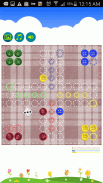
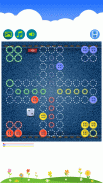
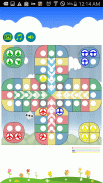

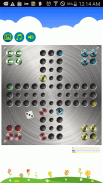
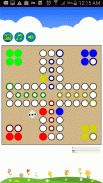
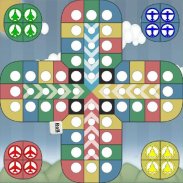


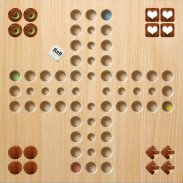
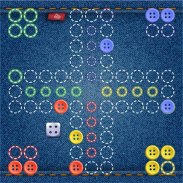
Ludo

Descrizione di Ludo
Ludo è un gioco da tavolo a croce e cerchio simile a Patolli e Wahoo che prevede lo spostamento di un determinato numero di pezzi o biglie sul tabellone, cercando di portarli nella zona di sicurezza.
Anche i giochi Uckers e Chaupar sono simili al ludo con alcune differenze nelle regole.
Mensch è un gioco da tavolo sviluppato in Germania da Josef Friedrich Schmidt nel 1907 o 1908.
Il gioco è stato rilasciato nel 1914 e ha venduto circa 70 milioni di copie, guidato da un'enorme popolarità tra le truppe tedesche in servizio nella prima guerra mondiale. Parqués, il gioco spagnolo Parchís il gioco americano Parcheesi (Parchisi), Aggravation and Trouble il gioco inglese Ludo.
Regole per giocare a Ludo:
- Numero di giocatori: da 2 a 4
- Oggetto: essere il primo giocatore a spostare tutti i propri pezzi fuori dall'area di partenza, attorno al tabellone e in casa.
- Installazione: un giocatore deve lanciare un 6 per spostare un pezzo dal cerchio iniziale sul primo quadrato della traccia. e un tiro di 6 dà un altro turno.
- Giocare: i giocatori si alternano in senso orario; inizia il lancio più alto del dado.
Ad ogni lancio, il giocatore decide quale pezzo muovere. Un pezzo si sposta semplicemente in senso orario attorno al brano dato dal numero lanciato. Se nessun pezzo può muoversi legalmente in base al numero lanciato, il gioco passa al giocatore successivo.
Se un pezzo atterra su un pezzo di un colore diverso, il pezzo saltato su viene riportato al suo cerchio iniziale.
Se un pezzo atterra su un pezzo dello stesso colore, questo forma un blocco. Questo blocco non può essere passato o sbarcato da nessun pezzo avversario.
- Vincere: quando un pezzo ha circumnavigato il tabellone, procede nella colonna principale. Un pezzo può essere spostato sul triangolo di casa solo con un lancio esatto.
Vince la prima persona a spostare tutti e 4 i pezzi nel triangolo di casa.



























